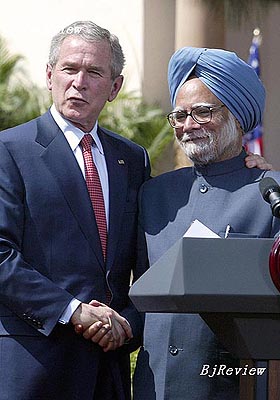
With nuclear non-proliferation a major topic of concern among many world powers, the latest nuclear energy agreement between the United States and India has raised new questions. Add to India's ongoing refusal to sign the Nuclear Non-Proliferation Treaty (NPT), the 39-year-old international accord that limits the spread of nuclear weapons, it's no wonder why Asian nerves have been stretched by the agreement.
Under the deal, signed in late July, the United States agreed to allow shipments of nuclear fuel and technology to India, reversing the previous U.S. policy of the past 30 years.
Some observers believe the accord could reset the global balance of power, because U.S. policymakers see India as a counterweight to mighty China. Other international affairs experts predict that the deal will complicate current nuclear power developments in Iran and on the Korean peninsula.
Despite international objections, Iran is planning to expand its nuclear power facilities. Meanwhile, international envoys have held talks to try to reach an agreement on the denuclearization of the Korean peninsula.
In any case, the deal is the first agreement that the United States has made with a country that has not signed the NPT. Neither Indian nor Pakistan is a signatory of the treaty, but both have tested nuclear weapons. The two countries test-fired nuclear-capable missiles in 2006. In 1998, they conducted a series of atomic weapons tests.
U.S. actions have baffled some international observers. Because India refuses to sign the NPT, the United States cannot transfer any nuclear material or technology to India for military use, according to U.S. laws and stipulations. So why is India the exception now?
According to a Xinhua News Agency report, Christopher Griffin, a research fellow at the American Enterprise Institute, said that the Bush administration's concessions were not a "real surprise, because [U.S.] interest is not as much in nonproliferation as in removing the barrier to strategic cooperation with India on a broader agenda."
The deal was done partly because the United States trusts India as a fellow democracy, said Zhao Qinghai, a researcher on South Asia at the China Institute of International Studies.
"Besides, India's record on non-proliferation remains good, which makes the country trustworthy to the United States on the nuclear cooperation aspect," Zhao said. Even if India breaks the agreement and uses U.S. nuclear technology for military purposes, Washington believes it could enact fast damage control by cutting off its nuclear supplies to India as stated in the agreement, he added.
Second, by signing the nuclear energy pact with India, the United States has boosted India's international position in Asia, Zhao said. In this way, India not only will serve as a key power to keep Iran's nuclear threat in check, but also will be able to cooperate with the United States on regional affairs in Asia. Because the agreement raises the level of the two countries' overall strategic partnership, this partnership will strengthen America's influence in Asia, Zhao said.
"America's new alliance with India will also squeeze Russia's strategy space in Asia, and restrict China's influence on the continent," he added.
Some observers believe that the United States inked the deal to reap other benefits. According to a report in Beijing-based Study Times, India's plan to enlarge its nuclear industry will create business opportunities valued to be at least $150 billion. The United States is expected to be the biggest beneficiary. The American company General Electric Co. has built nuclear reactors in India. It has predicted that its nuclear business in India would increase eight times between 2005 and 2010.
| 